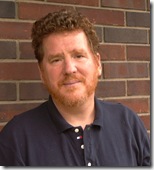[Guest Blogger] Meeting with Bill Gates

A few professors from University of Waterloo had the rare chance to meet with Bill Gates later last month during his last university tour as the Chief Software Architect at Microsoft. I asked Professor David Goodwin, the only representative from the Arts Faulty, to share his experience of meeting with Bill Gates. Enjoy!
First, can you tell us who you are and what you do at UW?
 I'm the Director of the Digital Arts Communication program, housed within Arts and Business, at the University of Waterloo. I am also a senior researcher at the Canadian Centre of Arts and Technology (UW), and have worked on prototyping, interaction design, and multimedia design initiatives for RIM, TorStar, StatsCan, and now Christie Digital Systems, Canada.
I'm the Director of the Digital Arts Communication program, housed within Arts and Business, at the University of Waterloo. I am also a senior researcher at the Canadian Centre of Arts and Technology (UW), and have worked on prototyping, interaction design, and multimedia design initiatives for RIM, TorStar, StatsCan, and now Christie Digital Systems, Canada.
How many faculties were invited to the faculty roundtable? What was it like to have such an exclusive session with him? What was your impression of Bill Gates in person?
The round table breakfast session consisted of 12 academics. Most were from Math and Computer Science, some from Engineering. I was the sole representative from the Arts Faculty. Meeting Bill Gates is always a once-in-a-lifetime experience, but especially so this time, since it was his last scheduled tour of universities as Head Architect of Software at Microsoft. So really, we were watching history in the making. For those of us who marveled at 64K computers, DOS, and WYSIWYG, and then saw the development of personal computing, the Web, and quad core processing, his visit -- and announced change of role at Microsoft -- marked the end of an era. It was a milestone event.
As a person, BG is an incredible simultaneous synthesizer and analyzer of information. He pulls things together as you speak. Then he breaks them out into components. Then he recombines them to offer new ways of connecting the dots. His ability to move from physics to hardware, and from databases to geopolitics, is very impressive, if not daunting, to say the least.
What are some topics discussed during the roundtable? Anything particularly interesting to you? What’s his vision for future computing? What do you think about his vision?
The topics reflected the research interests of people at the table. I was especially interested in his concept of the natural interface -- literally taking computing out of the box and integrating it into our everyday hand movements. No more mice and keyboards, for example. He really wants the tools to be extensions of us and our world, not high-bar-to-entry tools.
During the roundtable, did you have an opportunity to talk to him directly? If so, what did you talk about?
For my part, I was interested in BG's ideas about how to link design and development. Over time, as technologies mature, they become more about benefits, less about features; more about design, less about development, So I wanted to know beyond Expression -- which is a great first step to bridging between the two cultures. He agreed about the trend, and said that Microsoft was including more designers in the early stages of conceptualizing products and applications, not just to help MS design better, but to build tools that were more designer friendly.
What are some memorable moments during Bill Gates visit?
Without a doubt the most memorable moment was when a female student stood up in the audience and asked if she could add an extra question to the end of the session. To Tom Coleman's (the Dean of Math's) credit, he allowed her to ask the question: "how did you (BG) find the courage at 17 to start what was to become the world's biggest company?" The question showed real courage and wasn't pre-selected. The answer showed real humanity and clearly was from the heart. BG said the following (I paraphrase):
At 17 I didn't have much to lose. I promised my parents that I would go back to university if things didn't pan out. But I did worry about all those people who had spouses and children. They depended on the business succeeding. That's what worried me at night. So I made sure that I had enough money in the bank to pay everyone's salary for a year if none of my customers came through. That's how I got through it. Eventually there came a time, though, when we needed to hire 30 people, and that was a real crisis. I really didn't want to expand without a financial safety net in place. Ultimately, I compromised and said yes, go ahead and hire. But I want to know immediately when the increased revenues offset the costs of paying everyone a year's salary ... that way I could sleep again.
Conscience is a rare quality. In large companies, it's even rarer. I think Bill Gates' strategic sense, coupled with his conscience, makes him an exceptional leader. I look forward to hearing more about his contributions to world health and poverty.
Technorati Tags: Bill Gates, University Tour, University of Waterloo